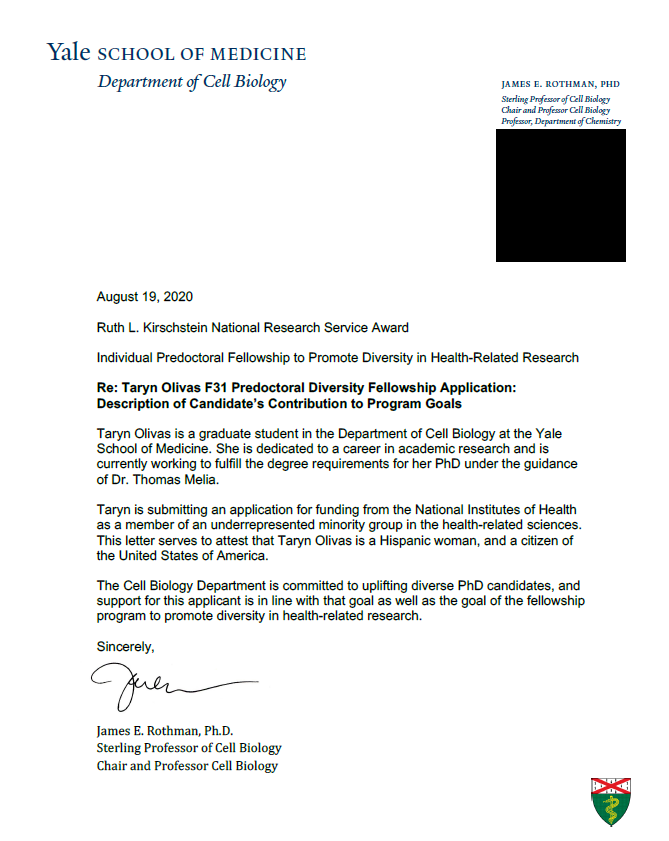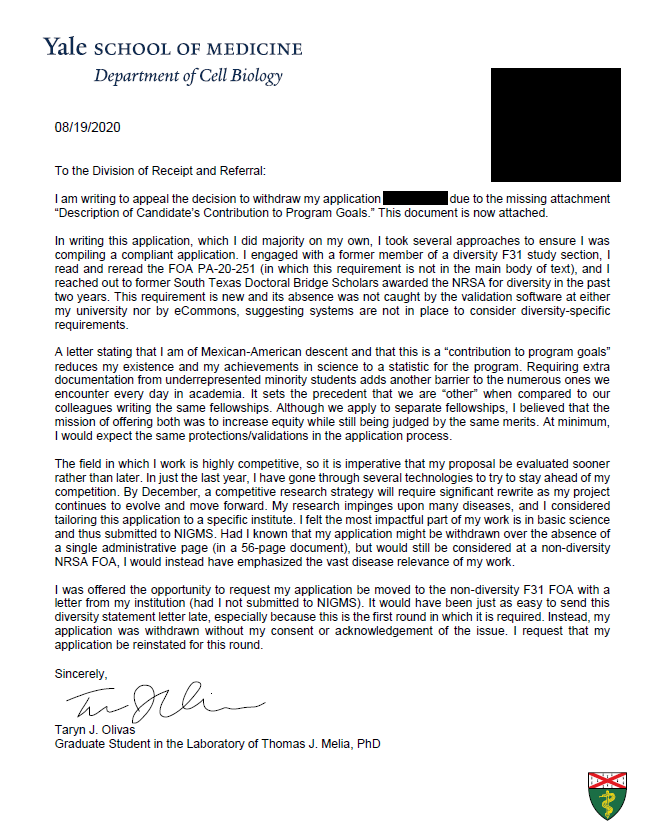I feel the need to share my experience with the F31 Diversity NRSA, not only to point out a #DEI problem in the application process but also to warn some of you in case nothing changes. (1/14)
@NIHDirector @NIH @NIGMS
@NIHDirector @NIH @NIGMS
My F31 Diversity NRSA was withdrawn by the NIH without my consent over one missing document. This document is entitled "Description of Candidate& #39;s Contribution to Program Goals". I& #39;ve attached it here to show what derailed an entire fellowship for a diverse candidate. (2/14)
It is a letter that needed to come from preferably the chair of my department, verifying that I am indeed a Hispanic woman. Considering this a "contribution to program goals" is offensive. Requiring this from only diverse candidates is offensive. (3/14)
I was told that I could send a letter from my institution to switch to the non-diversity NRSA, but that I could not send in this letter late. I appealed the decision (attached below), and was told that according to NOT-OD-19-083 I could not submit this letter late. (4/14)
They told me that rather than include this in the main body of the FOA, it was on page 70 of one of the many attached documents. Fine. I should have read the documents more carefully. But my institution as well as eCommons are supposed to have validation systems in place. (5/14)
My fellowship application made it through both systems with no flags for missing documents. When my PI asked why this whole separate document was not detected as missing, he was told that a flag for this requirement would confuse those applying to the non-diversity NRSA. (6/14)
Systems were not in place to ensure an F31 NRSA for Diversity was as thoroughly checked for compliance as a non-diversity fellowship application. This is the first round in which this document is required, so I have to ask: why wasn& #39;t there a system to detect its absence? (7/14)
Why isn& #39;t there a provision for this first round that it is allowed late since PIs and administrators alike did not know it existed to help students incorporate it? Why are we diverse graduate students always left to advocate for ourselves and figure it out alone? (8/14)
I had 25+ tabs open on my desktop from the NIH website as I tried to figure out all that was needed for this fellowship. The Division of Receipt and Referral attached a link that included this requirement I hadn& #39;t come across. There is just too much to sift through. (9/14)
I am at Yale University. I have access to offices that go over these grants and funding to cover me while I wait for fellowship decisions. I cannot begin to imagine how difficult it is to get funding without these resources. I know I am coming from a place of privilege. (10/14)
I never expected my appeal to mean anything to the NIH, but I do want my words to be acknowledged. The least that should be done is adding this document to the list of allowable post-submission documents. Better yet, this should just be a box to check on one of the forms. (11/14)
This document has no bearing on the application itself, and I am not even sure that it gets passed along to the study section. It isn& #39;t fair for a document that does not reflect on my scientific merit to completely ruin my application and delay my submission. (12/14)
Making it a letter you have to approach your department chair to sign is just one more barrier for those of us who are diverse in STEM. This fellowship& #39;s purpose is to train students as future independent researchers, and the process alone is pushing some of us away. (13/14)
All an experience like mine does is make different career paths more attractive. It& #39;s brought to the forefront of my mind once again that academia is unwelcoming, and there is much more advocacy to be done. (14/14)
#STEM #DiversityandInclusion #diversityinSTEM #gradschool
#STEM #DiversityandInclusion #diversityinSTEM #gradschool

 Read on Twitter
Read on Twitter



